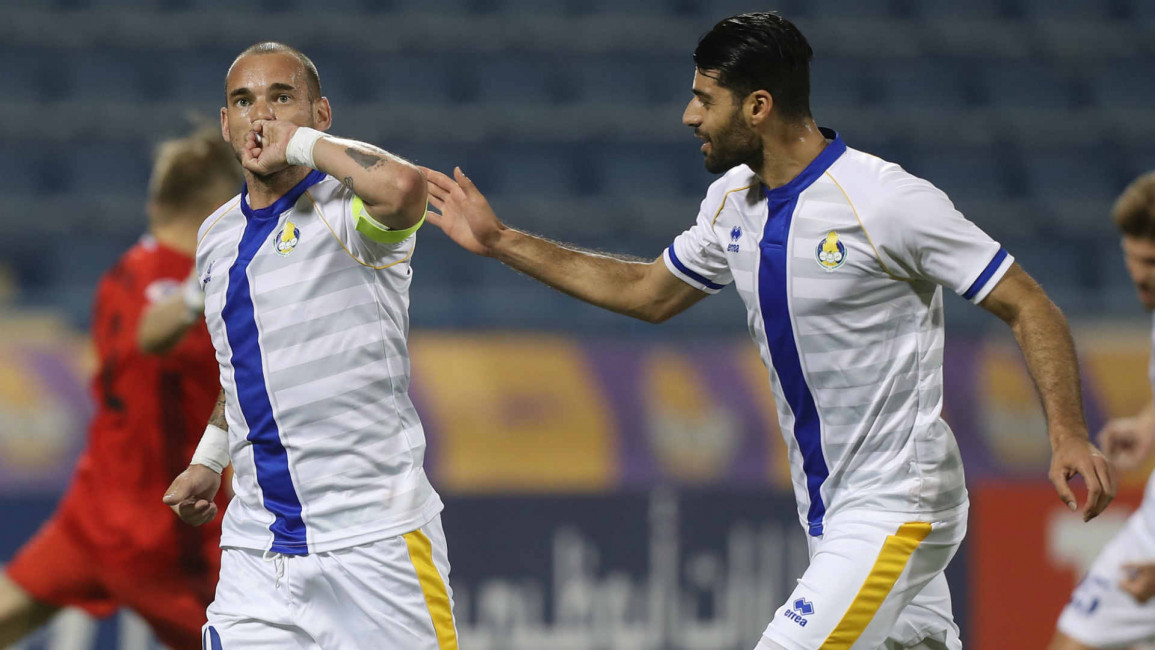
The Bitcoin ballgame: This week in Middle East football
The Asian competitions' qualification playoff rounds kicked off this week, in a series of intense games of Middle Eastern football.
While not all the region's representatives went through to the group stages of the AFC Cup and Champions League, this round of continental football has given us a solid indication of the footballing skill of west Asia.
On Monday, Hilal Al-Quds played the AFC Cup playoff second leg against Oman's Al-Suwaiq in Muscat. Despite scoring first, they managed to concede an equaliser, ending the game 2-1 on aggregate in favour of the Omani Cup winners.
For the second year in a row, the Palestinian championship-winner was eliminated in the qualification rounds, leaving many questioning the level of material support the Palestinian FA is giving to its clubs, and the clubs' professional preparation for the game at this level.
Shabab Al-Khaleel and Hilal Al-Quds, as good as they are in the domestic Palestinian leagues, lack the professionality to compete with Omani, Bahraini and Tajiki teams at the continental level - and that's a fact.
Twitter Post
|
Jordanian champions Al-Faisaly Amman, who aspired to become the first Jordanian club ever to make it to the Champions League group stage, have also faced reality.
In Qarshi, Uzbekistan, they took on Nasaf in 0 C degrees, and the Jordanians froze. The gap in quality was immediately apparent, and the Amman club were hammered 5-1, sending the Blue Eagles to compete in the second-tier AFC Cup for yet another season.
Despite the fact that both are fascinating clubs with a large community behind them, both Hilal Al-Quds and Al-Faisaly are falling behind in terms of professional capabilities on the global stage.
Guess who's back?
The biggest name in the Champions League qualifiers was most definitely the Emirati giants Al-Ain, and their magician Omar "Amoory" Abdulrahman. Al-Ain had a wobbly season last year and finished only fourth in the Arabian Gulf League. Therefore, the 2016 Champions League finalists had to go through the playoff qualification round.
 |
|
| Catch up wth all our football coverage |
But Al-Ain outclassed Malkiya from Bahrain 2-0, with goals from Swedish striker Marcus Berg and Brazilian talisman Caio.
They will now join the competition's "group of death", alongside Saudi Arabia's Al-Hilal, Iran's Esteghlal and Qatar's Al-Rayyan.
After the Asian Football Confederation declared that there would be no matches at "neutral grounds" for Saudi, Iranian or Qatari teams, this group, with some of the biggest clubs and most passionate supporters in the Middle East, has explosive political potential.
Middle Eastern football addicts, this is for you: Watch out for Group D.
At last, Qatari side Al-Gharafa completed their comeback to the competition for the first time since 2011. The Cheetahs have done well in the transfer window and signed both Dutch legend Wesley Sneijder and top Iranian striker Mehdi Taremi.
Twitter Post
|
The Qatari Super League Cup holders hosted Uzbeki team Pakhtakor, and sailed through to qualification with a 2-1 victory, thanks to goals from Sneijder and Diogo Amado.
The Asian Champions League 2018 edition kicks off in mid-February, and it will to be another exciting year.
Bitcoin in the transfer window
Turkish football club Harunustaspor has become the first in the world to complete a transfer using Bitcoin.
The Sakarya lower-league side paid 0.0524 $BTC to sign Ömer Faruk Kıroğlu.
Harunustapor play in Turkey's Sakarya First Division Group B and signed the 22-year-old for the equivalent of around $500, based on current conversion rates. If the tiny club thought the gimmick would being worldwide attention, it worked.
"We did this in order to make a name for ourselves in Turkey and around the world," the club's president told NTV Spor. "Now our name is being mentioned on television as if we are a professional club. We are proud of this."
The player himself added: "This is a first for me and for the world. We are doing something new. I am open to new things. I hope this deal works well for both sides."
Will the big clubs follow the Turkish minnows in their use of crypto-currency in the transfer market anytime soon? Who knows? One thing is sure: one of the biggest trends in the world has officially entered the football field.
Uri Levy runs the popular football blog BabaGol, which covers football and politics focusing on the Middle East. Follow him on Twitter, and read his blog here.




